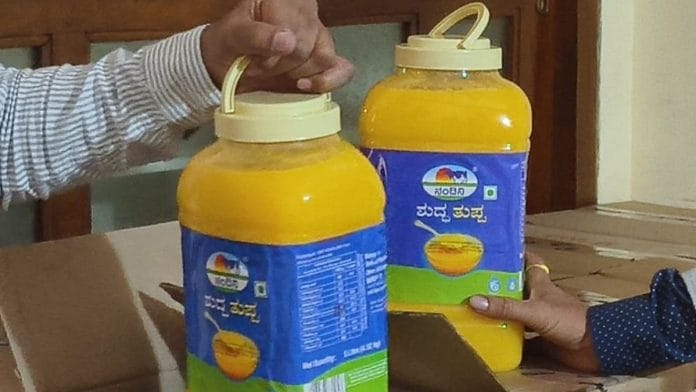New Delhi: A Bengaluru couple has emerged as unlikely criminals — “kingpins” in surreptitious, illegal activity. To outsiders, manufacturing and selling adulterated ghee might be a mundane crime. But in India, it’s positioned as the ultimate sin; an abomination that breaks moral codes.
Ramya and Shivakumar, the husband and wife duo at the centre of the storm, were investigated by the Central Crime Branch (CCB) and were found to be using sophisticated industrial equipment to manufacture the adulterated product, which they were selling under the Nandini brand. Nandini is owned and operated by the Karnataka Co-operative Milk Producers’ Federation (KMF). The arrests have confirmed the existence of a wide network — four people were arrested earlier, including a KMF distributor and his son.
“Understanding the high demand for Nandini ghee in Karnataka, the accused had been preparing adulterated ghee in Tamil Nadu, filling it into counterfeit Nandini sachets and plastic bottles, and supplying it to Bengaluru-based accused who held official KMF licenses,” said a statement by the Karnataka police.
The modus operandi
According to a report in The South First, it was only when KMF authorities began picking up on “unusual supply patterns” that the scandal came to light. A distributor, who earlier placed large orders of ghee, started requesting relatively paltry quantities. This was because his energies were focused on distributing a different product: adulterated ghee, which he was selling wholesale.
While the Bengaluru duo have been termed kingpins, if the scale of the scandal is to be used as a measure, there are a number of other characters. Over 8,136 litres of ghee worth over Rs 56 lakh, four vehicles used for distribution, and a bundle of cash were recovered.
The perpetrators were supposedly taking advantage of the popularity of Nandini ghee, which dominates the Karnataka market. They were purportedly manufacturing the counterfeit ghee in Tamil Nadu, packing it into sachets with fake Nandini branding and plastic bottles, and selling it in Bengaluru. Raids have also been conducted at shops and godowns associated with Krishna Enterprises in Bengaluru, which is registered under the name of one of the accused. As part of the investigation, which is still ongoing, the police also intercepted a truck coming in from Tamil Nadu which was transporting the packed adulterated ghee.
Also read: ‘71% of H-1B visas go to India, 12% to China’ — what are the allegations & the controversy
Not the first case
While the Nandini case is creating a stir, the ghee at the centre of the storm was manufactured using coconut oil and palm oil. This makes it a relatively smaller fry than the Tirupati scandal of last year — where the Tirupati temple’s famous ladoos were found to contain a combination of animal fats, including beef tallow. It was a political frenzy — Andhra Pradesh Chief Minister Chandrababu Naidu had said that “animal fat” was used to make ghee under YS Jaganmohan Reddy’s government.
The priest at the Ram Temple said that 300 kgs of Tiruapati ladoos had been distributed to devotees during the consecration at Ayodhya. It was seen as constituting a betrayal of the entire Hindu faith.
“Vaishnav saints and devotees do not even use garlic and onions. In such a context, the use of fat in the offerings is very unfortunate. It is a mockery of the Hindu faith,” the priest told PTI.
But this wasn’t the first that illicit ghee had become the subject of heated debate and turmoil. Back in 1983, tankers containing ‘shuddh’ Vanaspati ghee were intercepted, and 50 raids were conducted on factories of Vanaspati dealers across Punjab. Protests were staged, accusations were made, and politicians were on the defensive. This time, the culprits were a wealthy Jain family. The people’s outrage was also about consumer rights — the right to know what is going into their bodies.
“There was a sense of dismay, of being fooled. There was annoyance at organisations whose job it was to protect public food and safety,” Dilip Cherian, a communications professional who was then a journalist at Business India magazine, had told ThePrint.
In India, ghee morphs into more than a cooking essential. If history is anything to go by, it’s an emblem on which standards of morality, politics, and even religion are dictated.
(Edited by Aamaan Alam Khan)






